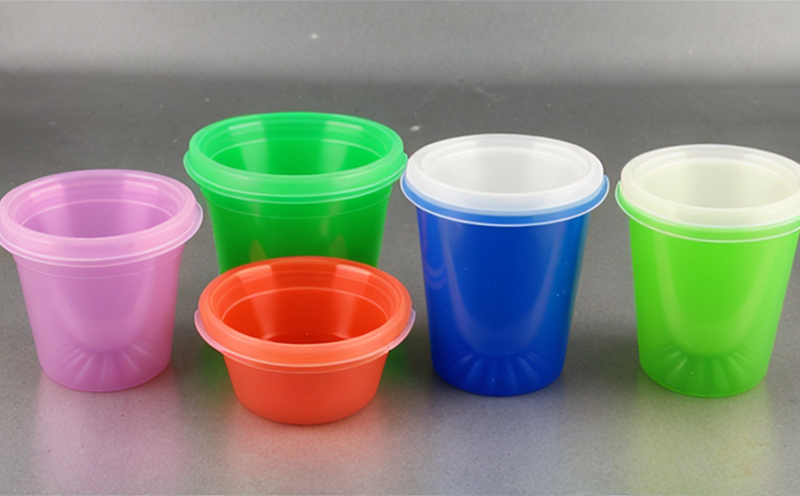EN 13130-1 Specific Migration Testing of Disposable Plastics
The EN 13130-1 standard is a cornerstone in the regulation and evaluation of disposable plastics used in contact with foodstuffs. This testing ensures that any materials, additives, or chemical compounds migrating from packaging into direct contact with food do not pose a risk to human health. Compliance with this standard is crucial for manufacturers aiming to meet regulatory requirements and gain market access to Europe.
Specific migration tests are conducted under controlled conditions to simulate real-world scenarios where the disposable plastic may come into contact with foodstuffs. The test subjects include various types of packaging, such as cups, containers, wraps, and lids made from polyethylene (PE), polystyrene (PS), polypropylene (PP), and other common plastics used in single-use applications.
The primary goal of these tests is to measure the amount of specific substances that can migrate into foodstuffs. The standard specifies a series of migration solutions, each designed to simulate a different type of food contact scenario, such as water, oil, alcohol, or acidic environments like fruit juices and vinegars. By following this protocol, laboratories can provide accurate data on the safety profile of the disposable plastics under scrutiny.
Specimen preparation is critical for ensuring reliable test results. Samples must be carefully cut to standard dimensions and prepared in a manner that reflects their intended use. This includes simulating real-world conditions such as thermal cycling or exposure to specific migration solutions. The testing apparatus typically consists of a heated block designed to maintain the specified temperature during the immersion phase.
The testing process involves immersing the prepared specimens into the appropriate migration solution for a prescribed duration, followed by a filtration step where any leached materials are collected and analyzed. Analytical techniques such as gas chromatography-mass spectrometry (GC-MS) or inductively coupled plasma mass spectrometry (ICP-MS) are used to identify and quantify the specific substances that have migrated into the solution.
The results of these tests provide a comprehensive overview of the potential risks associated with the use of disposable plastics. Compliance with EN 13130-1 ensures that products meet stringent safety standards, thereby protecting consumer health and ensuring regulatory compliance. This testing is particularly relevant for food packaging manufacturers, beverage producers, and other industries dealing with single-use plastic containers.
It is essential to note that the standard covers a wide range of disposable plastics used in direct contact with foodstuffs. By adhering to this protocol, laboratories can provide accurate data on the safety profile of these materials under controlled conditions. This ensures that products meet regulatory requirements and are safe for consumer use.
The testing process is meticulous and involves multiple steps to ensure accuracy and reliability. The use of appropriate migration solutions and careful specimen preparation are critical factors in achieving consistent results. Compliance with EN 13130-1 ensures that products meet stringent safety standards, thereby protecting consumer health and ensuring regulatory compliance.
The industry's reliance on this standard underscores the importance of rigorous testing to maintain product integrity and safety. By adhering to these protocols, manufacturers can ensure their products are safe for consumer use and comply with international regulations.
Industry Applications
- Food packaging manufacturers
- Beverage producers
- Disposable container suppliers
- Packaging material developers
- Regulatory compliance officers
| Migration Solution | Simulated Food Contact Scenario |
|---|---|
| Water | Standard beverage contact scenario |
| Alcohol | Wine or spirit contact scenario |
| Oil | Fat-based food contact scenario |
| Acidic Solutions (e.g., Vinegar) | Fruit juice or similar contact scenario |
Quality and Reliability Assurance
The testing process for EN 13130-1 involves several stages to ensure the reliability of the results. These include specimen preparation, immersion in migration solutions, filtration, and analysis using advanced analytical techniques. The use of standard migration solutions ensures that the testing conditions are consistent across different laboratories, leading to reliable and reproducible results.
Quality assurance is maintained through strict adherence to the protocol outlined in EN 13130-1. This includes using calibrated equipment, trained personnel, and standardized methods for specimen preparation and analysis. Regular calibration of instruments ensures that all measurements are accurate and consistent.
The use of advanced analytical techniques such as GC-MS and ICP-MS allows laboratories to detect even trace amounts of leached substances, providing a comprehensive overview of the potential risks associated with the use of disposable plastics. This level of detail is essential for ensuring product safety and regulatory compliance.
By adhering to these protocols, laboratories can provide accurate data on the safety profile of the materials under scrutiny. This ensures that products meet stringent safety standards, thereby protecting consumer health and ensuring regulatory compliance.
Competitive Advantage and Market Impact
In today's competitive market, compliance with international standards like EN 13130-1 can provide significant advantages for manufacturers. By demonstrating a commitment to safety and quality, companies can build trust with consumers and regulatory bodies.
The ability to conduct accurate specific migration tests ensures that products are safe for consumer use and comply with international regulations. This not only enhances the reputation of the manufacturer but also opens up new market opportunities. Compliance with such standards is increasingly becoming a requirement in many countries, making it essential for manufacturers to stay ahead of regulatory changes.
By investing in quality assurance processes and adhering to stringent testing protocols, companies can differentiate themselves from competitors and gain a competitive edge. This commitment to safety and compliance can lead to increased market share and customer loyalty.
The use of advanced analytical techniques ensures that products meet the highest safety standards, providing peace of mind for consumers and regulatory bodies alike. This level of assurance is becoming increasingly important in today's fast-paced global marketplace.





